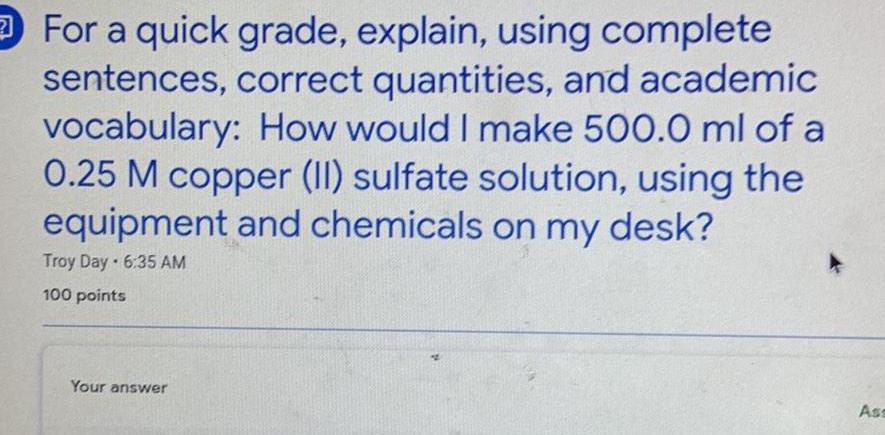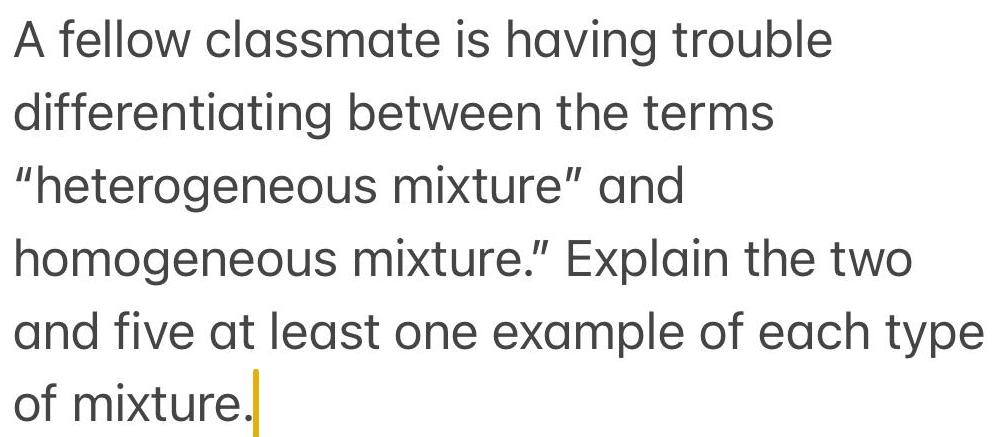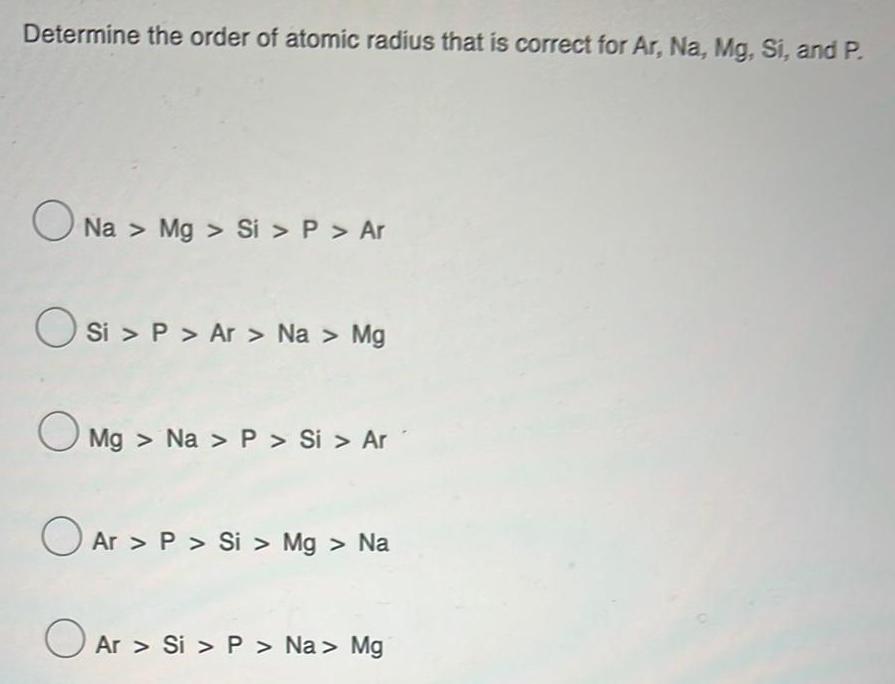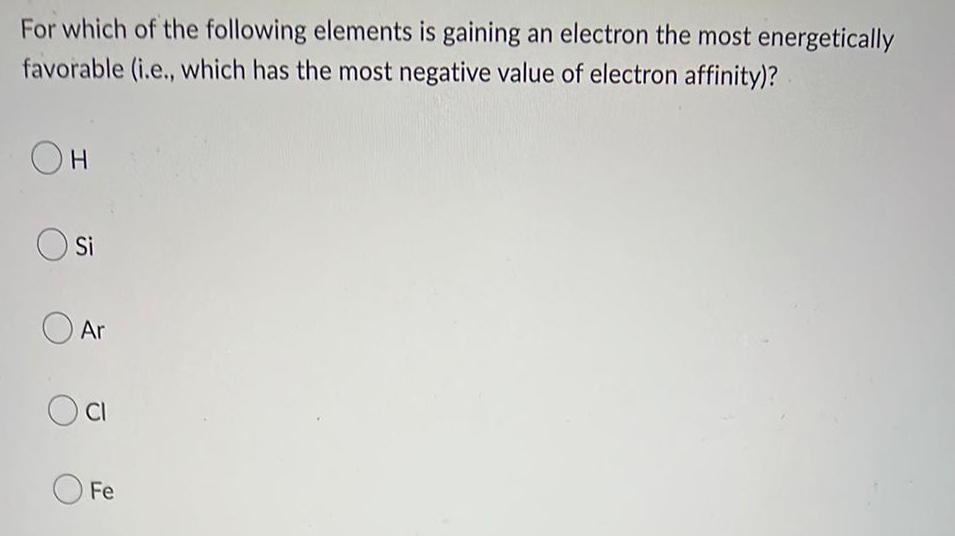Practical Detection Questions and Answers

Organic Chemistry
Practical DetectionWhat are the units for a second order rate constant Select one a M s 1 M s 1 mol L d M s 1 O b O c Oe s 1

Organic Chemistry
Practical DetectionWhat is the mass of 12 85mol of particles of Calcium Chloride CaCl Round any atomic mass from the periodic table to one decimal place

Organic Chemistry
Practical DetectionHow many moles of ideal gas are found in a 2 82 L container at 13 8 C and 0 729 atm Please report the number of moles to 3 significant figures

Organic Chemistry
Practical Detection2 What volume of gaseous NH3 at STP is produced if 25 grams of nitrogen gas is reacted with excess hydrogen gas N H NH3

Organic Chemistry
Practical Detection1 What type of reaction is the bromination of trans stylbene 2 What is the solvent used for the reaction 3 The solvent and trans stilbene were heated before adding the next reagent What was the ne reagent 4 What should you do with the gloves used to transfer the brominated reagent to the flask 5 What technique was used to separate the solid 6 What is the name of the funnel used for the technique above 7 How was the stirring rod prevented from falling into the funnel 8 What technique was used to determine identity and purity of the product 1

Organic Chemistry
Practical DetectionBased on the octet rule boron will most likely form a OB3 OB OB3 OB2 R2 ion

Organic Chemistry
Practical DetectionMultiple Choice One of the most effective strategies families have in preparing for a potential terrorist threat is to create a plan and prepare a room or portion of a secure place in the home where they can shelter in place which is stocked with enough food water and supplies to last a minimum of five to seven days False O True

Organic Chemistry
Practical DetectionFor a quick grade explain using complete sentences correct quantities and academic vocabulary How would I make 500 0 ml of a 0 25 M copper II sulfate solution using the equipment and chemicals on my desk Troy Day 6 35 AM 100 points Your answer Ass

Organic Chemistry
Practical DetectionThe mass spectrum of 3 pentanone has a very large ion peak at m z 57 Which of the following ions is thought to be responsible for this peak O A OB OC CH3CH CHCH3 CH3 3C A CH5C308 CH CH CH B C D

Organic Chemistry
Practical DetectionFill in the nuclide symbol for the missing particle in the following nuclear equation e N

Organic Chemistry
Practical DetectionWrite the dissolution reaction for cobalt II chloride in water Be sure to specify the state of each reactant and product Is cobalt II chloride considered soluble or not soluble A Soluble B Not soluble Based upon this the equilibrium constant for this reaction will be A Greater than 1

Organic Chemistry
Practical Detection4 attempts left Check my work Be sure to answer all parts MTBE CH 20 is a high octane gasoline additive with a sweet nauseating odor Because small amounts of MTBE have contaminated the drinking water in some towns it is now banned as a fuel additive in many areas MTBE reacts with O to form CO and H O Write a balanced equation for the combustion of MTBE Do not included states of matter in your answer So Guided

Organic Chemistry
Practical DetectionYou need to KNOW this basic information This quiz will be with NO NOTES I will provide a periodic table to be used YOU need to understand the periodic table There will be NO questions on the history of the atom atomic model You will need to know what makes up an atom and how the periodic table is arranged 1 6 Fill in the blank Circle the correct answers for charge where it s found what the mass is 1 Proton 0 charge In or outside the nucleus 1 or O amu atomic mass unit 2 Neutron charge In or outside the nucleus 1 O amu atomic mass unit 3 Electron charge In or outside the nucleus 1 or O amu atomic mass unit 4 Atomic number is the number of 0 0 5 Isotopes are the same number of protons different number of 6 The Mass number is equal to the number of Or number of

Organic Chemistry
Practical Detection1 Identify the species being oxidized and reduced in each of the following reactions Cr Sn Cr Sn 3Hg 2 2Fe 6Hg 2Fe

Organic Chemistry
Practical Detection2H2O2 aq H O l O2 g What is wrong with the chemical reaction above O It has 2 reactants O Mass is being destroyed It is balanced Mass is neither created nor destroyed It is a decomposition reaction O Mass is being created

Organic Chemistry
Practical DetectionCalculate the equilibrium constant for the following reaction at 25 C where AG rxn is 25 1 kJ mole CO g 2H g yields CH OH g 6 2 x 10 2 32 02 5 x 10 0 101

Organic Chemistry
Practical Detection11 action with an activation energy of 123 kJ mol and a frequency factor A of 9 13 x 1019 M 15 1 is carried out at 311K What is the value of the rate constant for this reaction 4 71 x 1021 M 1 1 Ob0 200 M s1 O c 9 13 x 1019 M 1g 1 O d 8 71 x 1019 M 1 O e 200 M

Organic Chemistry
Practical DetectionJessica is doing her pre lab homework for Chemistry She is asked to predict how many grams of oxygen gas are produced if 40 0 g of potassium chlorate is decomposed according to this balanced chemical equation shown 2KCIO3 s 2KCI s 302 g She performs the following calculation and gets 15 7 g of O2 as her answer KCIO mol KCIO 1 mol KClO3 3 mol O 122 55 g KClO3 2 mol KClO3 mol O 32 00 g 0 1 mol O 80 The next day when her group performs the experiment they obtain an actual yield of 14 5 grams of oxygen gas What is the percent yield for the experiment report your answer to the tenths place i e one decimal place

Organic Chemistry
Practical Detection2 For each reaction write an oxidation and reduction half reaction Then circle the oxidizing agent and underline the reducing agent A Fe Sn Fe Sn


Organic Chemistry
Practical DetectionA. What is the electron-pair geometry for P in PBr4*?
B. What is the electron-pair geometry for CI in CIF3?

Organic Chemistry
Practical DetectionComplete and balance the equation and describe what you observed when you added 6M
HNO3:
Cu(s) + HNO3(aq) →
![A mixture of 0.326 M Cl₂, 0.431 M F₂, and 0.842 M CIF is enclosed in a vessel and heated to 2500 K.
Cl₂(g) + F₂ (g)
2 CIF(g)
K₂ = 20.0 at 2500 K
Calculate the equilibrium concentration of each gas at 2500 K.
[CI,) =
[F₂] =
[CIF] =
M
M
M](https://media.kunduz.com/media/sug-question/raw/72596178-1660127996.7875578.jpeg?w=256)
Organic Chemistry
Practical DetectionA mixture of 0.326 M Cl₂, 0.431 M F₂, and 0.842 M CIF is enclosed in a vessel and heated to 2500 K.
Cl₂(g) + F₂ (g)
2 CIF(g)
K₂ = 20.0 at 2500 K
Calculate the equilibrium concentration of each gas at 2500 K.
[CI,) =
[F₂] =
[CIF] =
M
M
M

Organic Chemistry
Practical DetectionCalculate the volume of 0.200-M NaOH solution needed to completely neutralize 98.3 mL of a 0.280-M solution of the monoprotic acid HNO3. ml NaOH

Organic Chemistry
Practical DetectionAn elementary reaction is known to be bimolecular. What does this mean?
A) Two molecules of products are made
B) The order of the reaction is 2
C) Two molecules must collide at the same time
D) Both A and B
E) Both B and C

Organic Chemistry
Practical DetectionA reaction that produces heat for welding and incendiary bombs is the thermite reaction: iron (III) oxide reacts with aluminum to produce aluminum oxide and iron. How many grams of iron (III) oxide can be converted to aluminum oxide by the reaction of 47.1 g of aluminum (Hint: first write a balanced equation)?

Organic Chemistry
Practical DetectionUse the balanced equation for the conversion of salicylic acid and acetic acid to aspirin to answer the following questions.
C₂H6O3(s) + C₂H6O2l) ->C9H8O4(s) + H₂O(l)
salicylic acid acetic acid aspirin
How many grams of water are formed from 84.6 g of salicylic acid?
g H₂0

Organic Chemistry
Practical DetectionWhy did the 13 colonies revolt against England?
I - England taxed them for all printed documents.
II - England taxed them on glass, lead, paper, paint, and tea.
III- England tried to put all the colonies under a single crown.
IV - The colonists did not want The Church of England to be their required church.
I & II
I & III
III & IV
I, II & IV

Organic Chemistry
Practical DetectionThe pressure of a sample of helium is 8.184 atm in a 271.9 mL
container. If the container is compressed to 25.2 mL without
changing the temperature, what is the new pressure?
a. 88.3
b. 0.759
c. 837
d. 361

Organic Chemistry
Practical DetectionWhat is the formula for the ionic compound formed from the elements below?
aluminum and selenium?
Al₂Se3
AlSe2
Al3Se2
AlSe
Al₂Se

Organic Chemistry
Practical DetectionHow can you use quantitative chemistry
and reaction dynamics to explain and
optimize industrial processes and reactions
that happen in everyday life?

Organic Chemistry
Practical DetectionRead the following excerpt from the opening of Maxine Hong Kingston's "No Name Woman." What atmosphere is established by this
opening?
"'You must not tell anyone, my mother said. 'what I am about to tell you. In China your father had a sister who killed herself. She jumped
into the family well. We say that your father has all brothers because it is as if she had never been born.""
Joyful excitement
Angry questioning
Depressed nostalgia
Shocked curiosity

Organic Chemistry
Practical DetectionPick the molecule which is NOT a 1H NMR solvent.
A CDCI3
B. CH₂CCD3
C. D₂O
D. C6H6
A
B
C
D

Organic Chemistry
Practical DetectionA chemist is studying the following equilibirum, which has the given equilibrium constant at a certain temperature:
3O₂(g)=2O3(g) Kp=8. x 10-6
He fills a reaction vessel at this temperature with 7.0 atm of oxygen gas. Use this data to answer the questions in the table below.
Can you predict the equilibrium pressure of O3, using only the tools yes
available to you within ALEKS?
If you said yes, then enter the equilibrium pressure of O3 at right.
Round your answer to 1 significant digit.

Organic Chemistry
Practical DetectionWhat are the product(s) in this equation? Pb(NO3)₂(aq) + NaCl(aq) → PbCl₂(s) + NaNO3(aq)
Pb(NO3)2
PbCl₂
PbCl2 and NaNO3
Pb(NO3)2 and NaCl

Organic Chemistry
Practical DetectionA fellow classmate is having trouble differentiating between the terms "heterogeneous mixture" and homogeneous mixture." Explain the two and five at least one example of each type of mixture.

Organic Chemistry
Practical DetectionWhich of the following terms matches this definition:
the voice telling the story, not to be confused with the author
Setting
Narrator
Theme
Plot

Organic Chemistry
Practical DetectionIs the following reaction endothermic or exothermic? H₂(g) + I₂(g) → 2HI + 21 kJ
exothermic
endothermic

Organic Chemistry
Practical DetectionA student is making a measurement with a metric ruler that can measure to the tenths of a centimeter. Which of the following would be the student's properly recorded measurement with this ruler?
47 cm
47.1 cm
47.13 cm
47.134 cm

Organic Chemistry
Practical DetectionIn chemistry the volume for a certain gas is given by V = 20T, where Vis measured in cc and T is temperature in °C. If the temperature varies from 70°C to 120°C, find the set of volume values. (Enter your answer using interval notation.)

Organic Chemistry
Practical DetectionA chemist reacts 101.66 g of O2 and 25.47 g of C3H8 as shown below.
O₂ + C3H8 --> CO₂ + H₂O
Part a) Calculate the maxium mass of CO2 that can be produced.
Part b) Identify the limiting reactant.
Part c) Calculate the maximum mass of H2O that can be produced from
this reaction.
Part d) When complete, the reaction actually produced 38.95 g of H2O.
Calculate the percent yield.
Select all answer choices that apply to questions a-d.
Note: calculated values are rounded to 2 decimal places.

Organic Chemistry
Practical DetectionWhat is the wavelength of light associated with an n=3@n=2 transition in a
hydrogen atom,
443 nm
656 nm
091 nm
2.74 106 m
3.65-10-7 m-1

Organic Chemistry
Practical DetectionDetermine the order of atomic radius that is correct for Ar, Na, Mg, Si, and P.
Na > Mg > Si > P > Ar
Si > P> Ar> Na > Mg
Mg > Na > P > Si > Ar
Ar > P > Si > Mg > Na
Ar > Si > P > Na> Mg

Organic Chemistry
Practical DetectionFor which of the following elements is gaining an electron the most energetically
favorable (i.e., which has the most negative value of electron affinity)?
H
si
Ar
CI
Fe

Organic Chemistry
Practical DetectionA person has 100mL of a 1M NaCl Solution. If the solution was diluted to 0.25M with water, what will the final volume of the solution be?
0.125L
50mL
200mL
300mL
400mL

Organic Chemistry
Practical DetectionVolume of the starting solution:
Cyclohexane Component
Vapor temperature when distillation of cyclohexane started:
Vapor temperature when distillation of cyclohexane finished:
Volume of cyclohexane collected:
Density of cyclohexane collected:
Mass of cyclohexane collected (g)
30.0 mL
80.0 °C
83.0 °C
20.1 mL
0.779 g/mL

Organic Chemistry
Practical DetectionZinc metal and sulfuric acid (H₂SO4) react to form zinc (II) sulfate and hydrogen gas. What are the chemical formulas for the products of the reaction?
ZnSO4 + H₂
Zn(SO4)2 + S
ZnSO4 + H
H₂SO4 + Zn
ZnS + H₂

Organic Chemistry
Practical DetectionA person places 8.2mol of sodium chloride in a beaker, and they fill the beaker with water until the 89mL mark and stir. What is the concentration (molarity) of the solution they
0.092M
92.1M
9.2M
0.011M
10.9M

Organic Chemistry
Practical DetectionA person has a 2L sample of gas with a pressure of 2atm, a temperature of 25°C. How many particles, in moles, does the person have?
(R=0.0821)
0.016mol
0.16mol
2.42mol
6.12mol
100mol

Organic Chemistry
Practical DetectionA person combines 4g of A with some reactant B to form 25g of C and 8g of D according to the reaction below. Assuming the reactants were completely used up, what mass of reactant B was reacted? A+B-->C+D